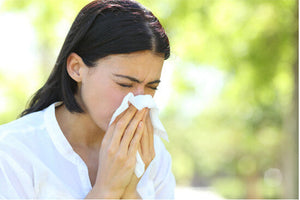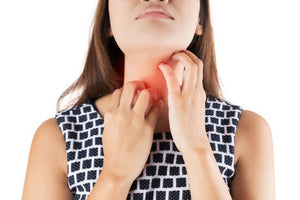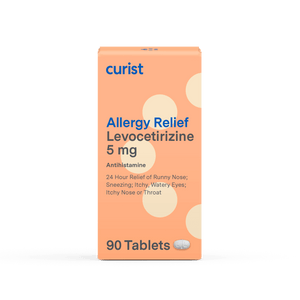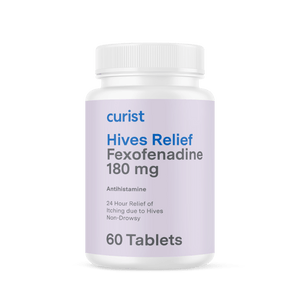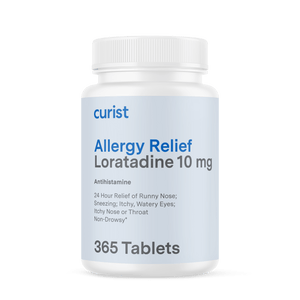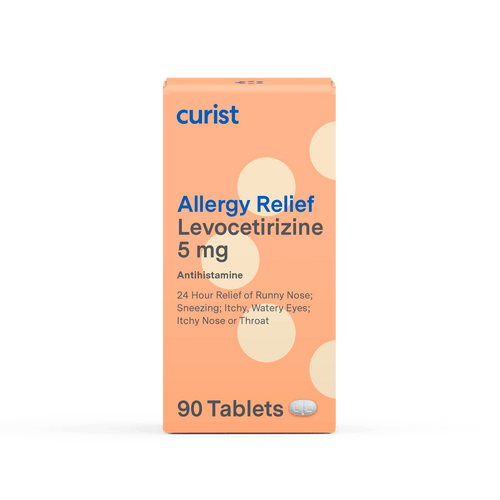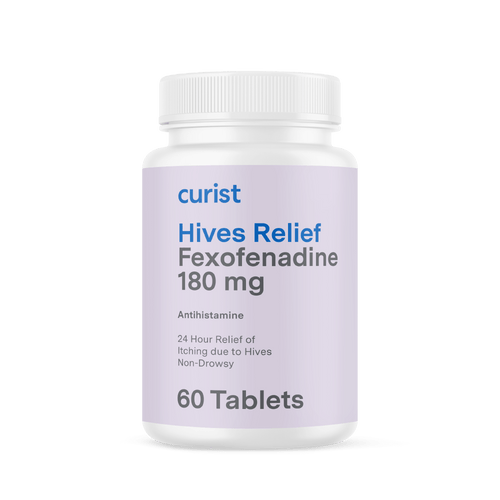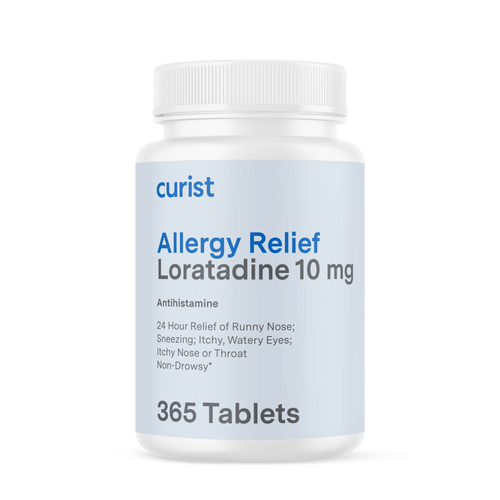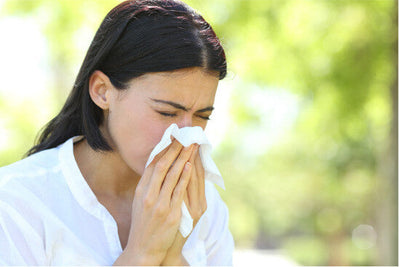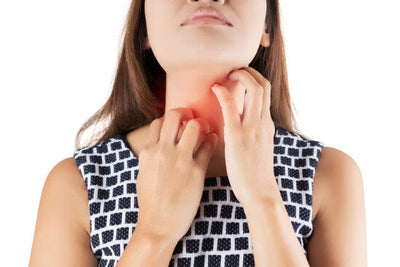by Dr. Waverly Yang, PharmD, Curist Pharmacy Advisor
Curist delivers over-the-counter medicines to your door at a fraction of the price of traditional brands. We hope everyone stays safe and healthy during this time.
As someone who suffers from eczema, psoriasis, and chronic hives, I know intense itching can affect not just your skin, but your health and overall well being. After years of experiencing symptoms as a patient and then studying them as a pharmacy student, I’ve finally learned how to manage my symptoms and ease off the itching. Although what worked for me may not work for everyone, below are my top insights and tips for those of us managing itchy skin.
What is Pruritus: Chronic vs. Acute Itchy Skin
A regimen to manage pruritus (AKA, itchy skin) will depend on whether the condition is acute (temporary) or chronic (long-term).
Acute pruritus, which lasts less than six weeks, can have a variety of causes, including contact dermatitis (a reaction to something touching your skin like poison ivy), fungal or bacterial infections, insect bites, an allergic reaction to a food, medicine or other allergen, or even just dry skin. In more rare cases, the itching could be a symptom of internal issues or underlying mental stressors. Acute rashes are usually temporary and often easy to cure.
Chronic pruritus, which lasts at least six weeks, may be caused by skin conditions (like eczema and psoriasis), sensitive or dry skin, and chronic hives. These conditions are often difficult to cure and may require symptom management and avoiding triggers to minimize the intensity.
If you develop a new rash or sudden itch persists for a few days, consult with your doctor or dermatologist to investigate the cause of the rash. If you have chronic pruritus, then it will be particularly important to follow the tips below.
What are Chronic Hives? What Are Symptoms of Chronic Hives?
Hives, also known as urticaria, are itchy, red or skin-colored patches of slightly raised skin (welts) that often show up in batches due to an allergic reaction. As with pruritis, there can be acute and chronic hives with the latter lasting more than six weeks. It can be difficult to figure out what is triggering your skin, but potential triggers could include stress, pressure on the skin, or even sunlight. Although they may not be dangerous to your health, they can be irritating, make it difficult to sleep, and interfere with your life.
What Causes Your Itchy Skin? Allergy Tests for Itchy Skin?
Every person is different, so it’s up to you to figure out what your skin triggers are. Triggers can include animals, plants, food, certain scents, hot water, as well as stress. Invisible triggers like stress and anxiety can affect your body’s nervous system and cause itching, burning, and hives. Be meticulous as you investigate your potential triggers. Keep a log of the things you eat, how stressed you are, new products you’ve tried, and any other details that could help you figure out what puts your skin on the fritz. To narrow down the list of potential triggers, you might consider taking a skin allergy test. I balked when my allergist told me I had a soy allergy (I couldn’t imagine life without soy sauce!), but cutting soy out of my diet was the biggest factor in improving my skin.
Itchy Skin Tip: Keep Your Skin Clean and Dry
It’s important to remove excess water from your skin. Excess moisture can cause irritation and create a breeding ground for bacteria and fungi. When cooking, cleaning, or washing the dishes, make sure to wear gloves to protect your hands, and always moisturize after washing your hands, especially if you’re washing frequently. If you’re perspiring, wipe off excess sweat with a towel and change out of your wet clothes as soon as you’re able.
Moisturize Your Itchy, Dry Skin with Fragrance-Free Products
Whether you’re hearing this for the first time or the millionth time, it’s true. Dry skin is a common culprit of triggering scratch attacks. When the skin is dry, it’s prone to inflammation, irritation, and a loss in elasticity. Quench your skin’s thirst with a good, fragrance-free moisturizer. Using a “fragrance-free” product is critical because even unscented products can contain fragrances that irritate the skin. Brands like Aveeno, Eucerin, Cetaphil, and Vanicream have made excellent fragrance-free products. The severity of your dry skin will determine whether you need a lotion or cream.
- For mild to moderately dry skin: try a lotion as a moisturizer.
- For very dry and flaky skin: try a cream for longer-lasting relief.
- For intensely dry problem areas: consider thicker products for better penetration like Vaseline and Aquaphor, but make sure the area is clean and dry before applying to prevent fungal infections from occurring.
My Best Itchy Skin Tip?
Carry a travel-sized version of your favorite lotion with you at all times. I am guilty of forgetting to moisturize, simply because I don’t always have lotion or cream on hand. Make sure to keep lotion readily accessible after every hand wash or whenever you feel an itch coming on. Remoisturize throughout the day.If your skin has an adverse reaction to any moisturizer, STOP using the product immediately. This is a signal that one or more ingredients in the product may not be suitable for your skin, and we want to keep our skin happy.
Should I Take An Allergy Antihistamine For Hives & Itchy Skin?
Itching sensations occur when your skin’s nerve endings send signals to your spinal cord and brain, which will trigger your body’s reflexive response to scratch away those sensations. Although the triggers for these signals may vary, they are usually mediated by naturally-produced chemicals, like histamine. Medications, like antihistamines, usually target this pathway and the chemicals involved to relieve the itching feeling.
What’s The Best Antihistamine For Itchy Skin and The Best Antihistamine for Hives?
Antihistamines have been a big help for me since it helps to calm down my chronic hives, in addition to reducing itchiness caused by my eczema and psoriasis. Common antihistamines are fexofenadine (brand Allegra), cetirizine (brand Zyrtec), loratadine (brand Claritin), and levocetirizine (brand Curist). For me, the best antihistamine has been cetirizine (brand Zyrtec) but everyone’s body is different so that may not work as well for you. I’d suggest trying each of the antihistamines until you can find the one that works best for you. If your itching is particularly bad at night, consider taking diphenhydramine (known as brand Benadryl), which will induce drowsiness to help you sleep as it alleviates your symptoms.

What If Antihistamines Stop Working or Don’t Work for Chronic Hives?
If the antihistamine you’ve been taking seems to have lost its effectiveness, it might be time to change up your regimen. It’s not always clear whether the diminished effect is because your body has built up a tolerance or because your allergies may have intensified, but it’s worth trying a “drug holiday.” Try taking a short break from your antihistamine, or try a different antihistamine altogether.
My chronic hives can be pretty stubborn, and, while antihistamines are a huge help, some flare-ups require a stronger approach. If antihistamines aren’t giving you enough relief, it’s best to see an allergist to talk about additional treatment options. They may recommend a combination of antihistamines or even prescribe other medications to manage your symptoms.
What About Topical Steroids for Hives & Itchy Skin?
If you are experiencing short-term, mild itching, you can probably self-treat with an over-the-counter topical steroid, like hydrocortisone. However, for skin conditions like eczema, psoriasis, and even chronic hives (especially for flare-ups), doctors may prescribe a more potent steroid cream than hydrocortisone.
It’s important to understand that persistent use of steroid creams (without breaks) may lead to topical steroid dependence, which can sometimes lead to even worse flare-ups and other negative side effects.
For the longest time, I had to use my steroid cream every day because my eczema would flare up the very next day without it. My skin had developed a steroid dependence, and I would experience withdrawal effects whenever I stopped. Always follow your doctor’s directions on using steroid creams and, when your symptoms are more manageable, consider tapering off the cream slowly and under your doctor’s supervision.
Living with itchy skin can be very irritating, but by paying attention to how your skin reacts, symptom management is definitely possible. Every person’s skin and body are different, but I hope this quick guide gives you a starting point to finding relief on your skin journey.

